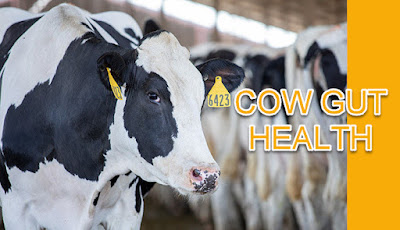WHY GUT HEALTH IS SO IMPORTANT IN COWS?
The ruminant digestive system is as complex as it is important to beef and dairy production. Understanding how it works and what to do when it’s compromised can contribute to better overall gut health in cattle. After all, a healthier gut helps improve performance, prevent leaky gut and mitigate stress — all of which lead to healthier cows and profits.
 |
| cow gut health importance |
Understanding the GI tract
The function of the gastrointestinal (GI) tract — primarily the villi in the small intestine — is to digest and absorb nutrients, defend against harmful pathogens, prevent harmful compounds from entering the host and maintain a balanced microbiome. Leaky gut occurs when a compromised GI tract lining allows harmful substances to be absorbed into the bloodstream, resulting in a variety of health implications.
A healthy gut:
- Breaks down nutrients for optimal absorption
- Promotes and maintains immune system health
- Maintains structural intestinal integrity
- Preserves the balance of microflora
A damaged GI tract, or leaky gut, could result in:
- An unbalanced microbiome, leading to a higher prevalence of enteric pathogens
- Reduced digestive and absorptive capacity
- Decreased intestinal integrity of the gut, allowing harmful pathogens and toxins to enter into the host, which can lead to both intestinal and systemic inflammation
- A compromised immune system
 |
| healthy gut |
Stressors impacting gut health in cattle
Just as exposure to pathogenic bacteria in the environment is inevitable, so are animal stress events. Under stress, both the mucosal layer and the tight junctions are negatively impacted, often leading to inflammation and reduced integrity of the intestinal barrier.1 Reduced intestinal integrity indicates there is a breakdown in the tight junctions between the epithelial cell membranes, allowing for intestinal permeability.
Without these tight junctions, pathogenic organisms like clostridia, Salmonella and Escherichia coli can cross the intestinal barrier and into the bloodstream, resulting in an immune response that makes cattle more susceptible to diseases that can reduce their performance and your profitability.2
All cows endure stressors daily, and some are unavoidable. To ensure your cattle are set up for optimal health and productivity, it’s important to identify which stressors you can alleviate, and which ones you need to mitigate with a direct-fed active microbial.
 |
| factors affecting gut health in cows |
 |
| factors affecting gut health in cows |
Choosing a microbial
Not all probiotic products are active microbials, and not all active microbials are the same. When evaluating active microbial solutions to fight against intestinal-compromising pathogenic bacteria, consider the following factors:
 |
| Choosing a microbial |
Why mode of action matters
By now you know why gut health in cattle is important, so why does the mode of action matter? By understanding how the active microbial works the ruminant digestive system, one can better predict how the host will respond to the product once it is fed. This helps create confidence in the product, as it has gone through the rigorous testing and research to prove the mode of action.
References:
1. Williams, J. M., et al. (2015, May). Epithelial cell shedding and barrier function: A matter of life and death at the small intestinal villus tip. Veterinary Pathology. 52(3):445-455.
2. Chakaroun, R. M., L. Massier and P. Kovacs. (2020, April). Gut microbiome, intestinal permeability, and tissue bacteria in metabolic disease: Perpetrators or bystanders? Nutrients. 12(4):1,082.
